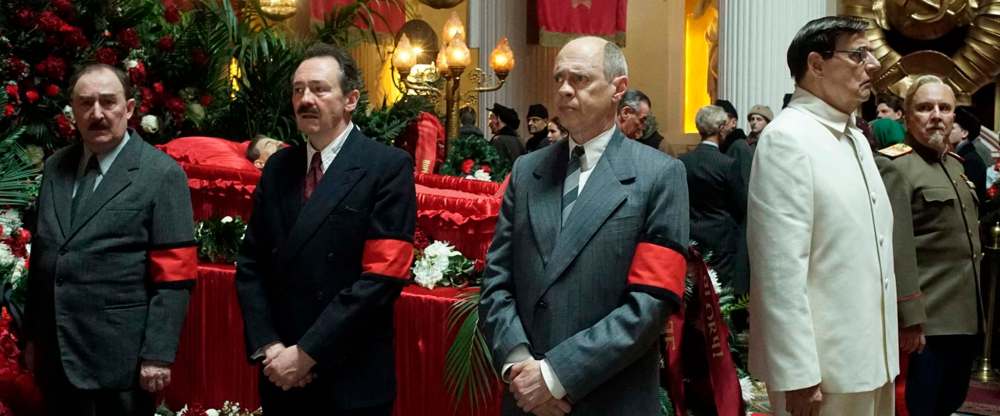A comedy of terrors
Sharp satire refuses to make light of Soviet tyrant's reign
Advertisement
Read this article for free:
or
Already have an account? Log in here »
To continue reading, please subscribe:
Monthly Digital Subscription
$0 for the first 4 weeks*
- Enjoy unlimited reading on winnipegfreepress.com
- Read the E-Edition, our digital replica newspaper
- Access News Break, our award-winning app
- Play interactive puzzles
*No charge for 4 weeks then price increases to the regular rate of $19.00 plus GST every four weeks. Offer available to new and qualified returning subscribers only. Cancel any time.
Monthly Digital Subscription
$4.75/week*
- Enjoy unlimited reading on winnipegfreepress.com
- Read the E-Edition, our digital replica newspaper
- Access News Break, our award-winning app
- Play interactive puzzles
*Billed as $19 plus GST every four weeks. Cancel any time.
To continue reading, please subscribe:
Add Free Press access to your Brandon Sun subscription for only an additional
$1 for the first 4 weeks*
*Your next subscription payment will increase by $1.00 and you will be charged $16.99 plus GST for four weeks. After four weeks, your payment will increase to $23.99 plus GST every four weeks.
Read unlimited articles for free today:
or
Already have an account? Log in here »
Hey there, time traveller!
This article was published 27/03/2018 (2777 days ago), so information in it may no longer be current.
The style of humour in satirist Armando Iannucci’s latest film, The Death of Stalin, is a frightfully uneasy one. Sight gags and slapstick erupt from a pervasive atmosphere of dread and terror.
In one early scene, an orchestra conductor is so overcome with worry that a wiretap may have caught him disparaging the titular dictator’s musical discernment that he faints, thwacking his head on a metal bucket. Just moments before, Stalin (Adrian McLoughlin) had phoned in a request for a recording of the performance.
But because it’s for live radio, it hasn’t been taped, causing the producer (Paddy Considine) to sheepishly hold the studio audience hostage for a repeat performance. They applaud wildly — knowing that their very existence is at the pleasure of an unpredictable madman.

A replacement conductor — still in his bathrobe — is dragged in from his home, where he assumes that the knock on his door is the secret police coming to haul him off to prison (or worse). As he leaves his building, many of his neighbours also are being violently carted away.
Even the highest-ranking members of the government are scared that they will inadvertently do something to get themselves killed: Communist Party secretary Nikita Khrushchev (Steve Buscemi) has his wife write down everything he says — along with the dictator’s reaction — studying the ever-evolving list to refine his behaviour. Central Committee member Vyacheslav Molotov (Michael Palin) is such a loyalist that when Stalin’s goons imprison his wife, he assumes she deserved it. (This sets up a painfully funny moment, later in the film, when the two are reunited after Stalin’s death, which occurs early on, precipitating the power struggle that is the basis of the plot.)
As Stalin’s deputy, Georgy Malenkov (Jeffrey Tambor) should be next in line, but Stalin’s brutal enforcer Laventri Beria (Simon Russell Beale) has already begun his savage plotting for power. Beale, who’s known as a great Shakespearean stage actor, plays Beria like Iago, jumping from one betrayal to another. In a more traditionally constructed comedy, he’d play the straight man, acting as a foil to the comic antics of Buscemi, Palin and Tambor. But while Iannucci whips up a fever-pitch frenzy, his film, based on a 2017 graphic novel, is not a farce, but a tragicomedy. The dark elements are too corrosive to be tempered by laughter.
When Stalin’s deranged son pulls out a gun in a crowd of mourners surrounding his father’s coffin, there’s a palpable fear that he might actually kill someone. This dampens the humour in a series of one-liners (penned by Iannucci, with co-screenwriters David Schneider and Ian Martin). Throughout the film, comic moments are derailed by jarringly violent outbursts (or the threat of them).
Remembering the uproarious laughter of Iannucci’s In the Loop (2009) and the TV series Veep can create a longing for more humour than Iannucci is willing to dole out here. But the filmmaker doesn’t seem to mind if he steps on the joke. He has a serious point to make about the dangers of surrendering truth in the face of power.
When power is based on whim and blind loyalty, that creates an untenable atmosphere, the film argues, placing ideology on shaky moral footing. One minute, Beria is gleefully passing out death lists, with sadistic instructions and the next minute he’s retracting them as the political landscape shifts.
It’s not surprising that the film was banned in Russia, where Vladimir Putin appears to be following in the footsteps of the dictator who is being lampooned here, suppressing speech and allegedly eliminating his critics. But Iannucci has other Western targets in his sights as well. By implication, The Death of Stalin is about all power-hungry leaders with shifting ideology and demands of absolute loyalty.
Anyone else sound familiar?
— Washington Post
History
Updated on Tuesday, March 27, 2018 7:50 AM CDT: Adds photo


